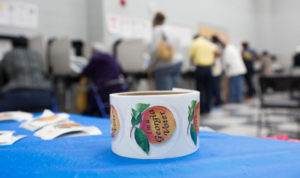
The Supreme Court agrees to hear a challenge to tech company protections, President Biden outlines agency climate actions, and more…
IN THE NEWS
- The U.S. Supreme Court agreed to hear a challenge to the liability protections granted to social media companies under the Communications Decency Act. Under Section 230 of the Act, social media companies are immune from legal consequences that may result from content posted by their users. In Gonzalez v. Google, the family of Nohemi Gonzalez, a U.S. citizen killed in an ISIS terrorist attack, alleges that Google’s algorithms on YouTube recommended ISIS recruitment videos to targeted users and thereby contributed to the “growth and activity of ISIS.”
- President Joseph R. Biden unveiled a series of reports detailing the steps taken by federal agencies to address climate change. The plans outlined steps the agencies intended to take to address and mitigate the most severe climate risks. For example, The Centers for Disease Control created a tool that provides real-time heat data to help state and local emergency and public health planners prepare for and respond to extreme heat events. The Biden Administration explained that the agency plans “minimize disruptions to federal operations, assets and programs while creating safer working conditions for employees.”
- The Supreme Court declined to hear two challenges to a federal ban on “bump stocks,” which are devices that allow semi-automatic guns to fire at a more rapid speed. Under President Donald Trump, the Bureau of Alcohol, Tobacco, Firearms, and Explosives implemented the ban after a gunman used bump stocks to kill 58 people at a Las Vegas concert. The recent challenges did not take issue with the scope of the right to bear arms, but instead argued that the Bureau did not have the authority to ban bump stocks.
- A federal judge held that Georgia’s election system does not violate voters’ constitutional rights. A voting rights group, Fair Fight Action, challenged Georgia’s failure to maintain accurate lists of voters, its procedures for in-person absentee ballot cancellations, and its “exact match” law, which mandates that a voter’s name on their voting application match their government identification. Fair Fight Action alleged that these policies had a disproportionate impact on low income voters and voters of color, and violated the U.S. Constitution and the Voting Rights Act of 1965. The court concluded that Georgia’s justifications for its voting practices “outweigh any potential burdens on voters.”
- A federal judge in Texas struck down U.S. Equal Employment Opportunity Commission (EEOC) guidance stating that employers cannot bar LGBTQ employees from using bathrooms or locker rooms that correspond to their gender identity. The EEOC issued the guidance after the Supreme Court ruled in Bostock v. Clayton County that discrimination on the basis of sex includes discrimination on the basis of gender identity or sexual orientation. The federal court held that although employers cannot discriminate against employees on the basis of their sexual orientation or gender identity, the Bostock decision does not extend to employees’ “correlated conduct,” such as sex-specific dress, bathroom use, pronouns, or health care practices.
- The U.S. Department of the Interior issued policies to improve the accountability of its law enforcement officers, who protect federal parks, waters, and certain wildlife. The new policies include a body camera mandate for public-facing officers who carry firearms, a use-of-force reporting and tracking requirement, and the restriction of “no-knock entries” while executing a search warrant. Secretary of the Interior Deb Haaland charged a task force with developing the policies after alleged U.S. Park Police misconduct and use of excessive force.
- The Federal Aviation Administration (FAA) issued a final rule requiring that flight attendants have at least ten consecutive hours of rest between work days. The rule implements an objective of the FAA Reauthorization Act of 2018, which directed the FAA to increase the minimum number of rest hours flight attendants must have from the previous requirement of either nine or eight hours. Earlier this fall, thousands of Southwest Airlines and United Airlines flight attendants picketed airports, demanding increased rest periods. U.S. Transportation Secretary Pete Buttigieg explained that “this new rule will make it easier for flight attendants to do their jobs, which in turn will keep all of us safe in the air.”
- The U.S. Environmental Protection Agency (EPA) announced plans to expedite the risk assessment and approval process for certain chemicals used in batteries, electric vehicles, semiconductors, and renewable energy infrastructure. Under the Toxic Substances Control Act, new chemicals must undergo a review process before entering the marketplace. EPA specified that the new policy streamlines the review process for mixed metal oxides, which are a key component of the lithium-ion batteries used in electric vehicles and other renewable infrastructure. The policy also advances the goals of the Inflation Reduction Act, which established tax credit incentives to increase renewable energy generation.
WHAT WE’RE READING THIS WEEK
- In a Brookings Institution report, Matthew Gregg, senior economist for the Center for Indian Country Development at the Federal Reserve Bank of Minneapolis and Robert Maxim, senior research associate at Brookings Metro, discussed the exclusion of Native Americans from the remote work economy and its benefits. Gregg and Maxim found that at the height of the pandemic, Native Americans worked from home at a rate 8 percentage points below white workers, and still worked from home at a rate 2 percentage points lower than white individuals in 2022. These trends, Gregg and Maxim argued, are explained by the fact that Native Americans are overrepresented in frontline jobs, underrepresented in jobs requiring a college degree, and underserved in internet infrastructure. Gregg and Maxim recommended that policymakers support Native American digital skill development and that Congress provide full funding for Tribal colleges.
- In a forthcoming New York University Law Review article, Gabriel Chan, associate professor at the University of Minnesota’s Humphrey School of Public Affairs, and Alexandra B. Klass, professor at the University of Minnesota Law School, argued that U.S. federal and state regulators should reform energy regulations to ensure low-income and marginalized communities can access affordable and reliable energy. Chan and Klass urged regulators to take steps to distribute the costs and benefits associated with the transition away from fossil fuels in an equitable manner. Among other policy recommendations, Chan and Klass proposed that regulators reduce the cost of energy for low-income customers, increase access to energy efficiency programs, and invite energy justice advocates and low-income customers to participate in ratemaking proceedings.
- In a Center for American Progress report, senior fellow Mark Haggerty and senior director Nicole Gentile argued that, following a nationwide transition to clean energy, the U.S. Department of the Treasury should establish a fund to provide payments to communities dependent on local revenue raised by fossil fuel extraction activities. For example, Haggerty and Gentile explained that a recent market shift in favor of natural gas resulted in crippling revenue loss for coal-mining towns and fueled political resistance to renewable energy. Haggerty and Gentile proposed the fund be financed by and managed by an independent board that represents these communities’ interests.
EDITOR’S CHOICE
- In an essay in The Regulatory Review, Jeff Kosseff, associate professor of cybersecurity law at the United States Naval Academy, dispelled criticism that the immunities granted to online platforms under Section 230 of the Communications Decency Act rely on the neutrality of those platforms. On the contrary, Kosseff argued, Congress issued Section 230 to encourage these digital platforms to moderate users—and not necessarily to remain neutral. Kosseff warned, however, that today’s platforms may suffer from “too little moderation.”



